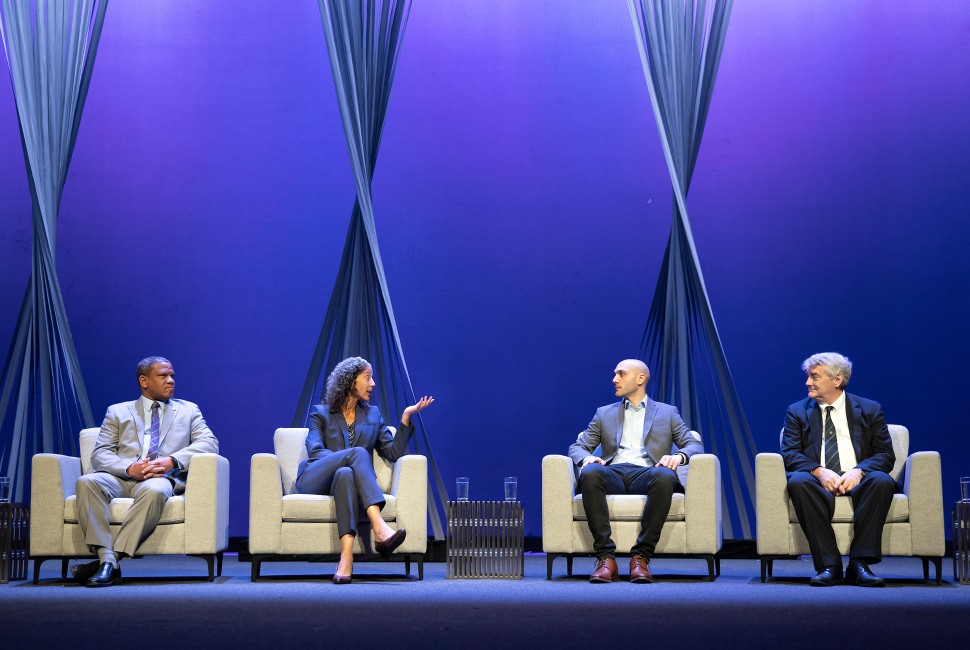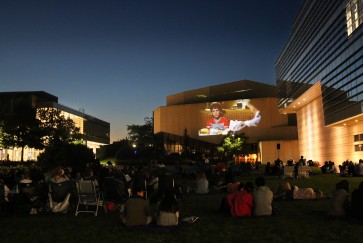As a haven for intellectual exchange and academic freedom, the University fosters the sparks of innovation that ignite from collisions across difference.
But such collisions — spanning disciplines, backgrounds and worldviews — sometimes create conflict. Five Northwestern scholars, whose personal political ideologies vary across the political spectrum, brought a wide range of expertise, and humor, to bear on questions that go to the heart of higher education and American democracy.
The panel discussion — which took place Thursday, June 1, at Cahn Auditorium on the Evanston campus — was one of two academic panels organized to discuss contemporary topics of importance of higher education as the University geared up for the inauguration of President Michael H. Schill.
“If I sought to design a worst possible marriage, it would look a whole lot like the relationship between Democrats and Republicans,” said moderator Eli Finkel, a professor of psychology in the Weinberg College of Arts and Sciences and director of the Relationships and Motivation Lab, whose comparison of American politics to a bad marriage set the tone for the kind of dialogue University leaders want to foster among students and scholars who disagree.
“Most of us would conclude that some limits should be imposed on free speech. But where is the line between acceptable and unacceptable speech, and how is that line enforced?” Finkel said.
Liberal campus claims and campus culture
“I did not go to college thinking, ‘I am just going to speak now, I’m going to say whatever I want, wherever I want, with no consequences,’” said Alvin B. Tillery Jr., sharing his own experience of overt racism directed at him by professors at Harvard when he was a graduate student. A professor of political science and director of the Center for the Study of Diversity and Democracy in Weinberg College, Tillery said higher education should do more to set standards by teaching students to rely on good information and facts.
Tillery, who by his count has taught introduction to American politics to approximately 10,000 students at three universities since 1999, also said conservative voices on college campuses are alive and well.
“The handwringing on campuses about liberal indoctrination is about the ways in which our society has moved, from a public opinion standpoint to the Left. The center of society is now much more intolerant of racism, homophobia, sexism,” Tillery said. “We’ve got to be attuned to that when we are setting standards.”
The greatest threat to free speech
Sociology professor and chair of what will soon be Northwestern’s Black Studies department Mary Pattillo talked about being “right in the crosshairs of so much of what is being demonized in our culture” and the surge in legislation, from the state level to the very local level, aimed at limiting the teaching of what is often characterized — or mischaracterized — as Critical Race Theory (CRT).
Twenty percent of 563 pieces of legislation proposed between 2021 and 2022 across the country have been directed at higher education, Pattillo said, citing research conducted by a student.
Reading the text of anti-CRT legislation going into effect July 1 in Florida, Pattillo talked about the dangers of policies based on the false premise that professors are teaching students that members of one race are superior to another, or members of one sex are superior to another.
“No one is teaching this in the classroom, but this mischaracterization, nonetheless, is having a chilling effect,” Pattillo said, describing the language in anti-CRT bills as McCarthyism.
The importance of dissent
Nour Kteily, professor of management and co-director of the Dispute Resolution Research Center in the Kellogg School of Management, studies how and why conflict emerges between groups in society, and how to equitably resolve it. Considering the role of power and status differences between groups, he investigates how inequality and social hierarchy exacerbate conflict.
“What are the spaces we provide for legitimate dissent? We need to talk not only about people having a platform to say what they want, but we need to encourage rather than discourage full-throated dissent,” he said, recognizing the important role of protest on and off college campuses.
“It’s important to focus on the problem not the person, that is wise, but I also don’t think we want a group of people so afraid of stepping on someone’s toes that they don’t fully interrogate an idea,” he said.
Safeguarding free speech – even when controversial
Steven G. Calabresi, Northwestern Pritzker School of Law professor, is co-founder and co-chairman of the Federalist Society’s Board of Directors and worked in the West Wing of President Ronald Reagan’s White House.
Calabresi distinguished between the very different scenarios of a university inviting a controversial or hateful person to speak versus an invitation from a student group. He suggested that institutions of higher education can take steps to address the concerns of those who object to a controversial speaker invited by a student group while safeguarding free speech by asking students to host a debate instead of a single speaker.
If students refuse or are unable to organize a debate, “universities should let the event occur and take every step possible to prevent it from getting disrupted. But some appropriate person with some connection to the university can and should speak out and point out opposing viewpoints and identify speech … as being hateful and wrong.”


